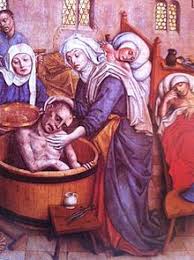On Faith and Caring – Memorial: St. Elizabeth of Hungary
(3 Jn 5-8; Ps 112; Lk 18:1-8)
*****************************************************
St. James would declare faith without works is dead.
Today the church honors someone who models expressing faith through charity – St. Elizabeth of Hungary.

St Elizabeth of Hungary
Also known as Elizabeth of Thuringia, she was born in 1207 to King Andrew II of Hungary and Gertrude of Andechs-Meran. At age 4, she was betrothed to Ludwig of Thuringia and sent to live in his family’s castle. They married when Elizabeth was 14, and by all accounts enjoyed a happy though brief life together. Elizabeth built hospitals to care for the needy and the sick, although many of the nobles resented the expense. When her husband died of plague while away on a crusade, Elizabeth was accused of mismanagement and had to leave Wartburg. Having made provision for her children, Elizabeth entered the Third Order of St. Francis and spent her days caring for the sick, the aged and the poor. Renowned for her prayer, works of charity, spirit of penance and great gentleness, she died at Marburg in 1231 at the age of 24 and was canonized by Pope Gregory IX in 1235. She is patron saint of the Franciscan Third Order and of Catholic charities.
Here is what her spiritual director, Conrad of Marburg, had to say about one whosefaith-based goodness overflowed:
“She was a lifelong friend of the poor and gave herself entirely to relieving the hungry. She ordered that one of her castles should be converted into a hospital in which she gathered many of the weak and feeble. She generously gave alms to all who were in need, not only in that place but in all the territories of her husband’s empire. She spent all her own revenue from her husband’s four principalities, and finally sold her luxurious possessions and rich clothes for the sake of the poor.

Twice a day, in the morning andin the evening, Elizabeth went to visit the sick. She personally cared for those who were particularly repulsive; to some she gave food, to others clothing; some she carried on her own shoulders, and performed many other kindly services. Her husband, of happy memory, gladly approved of these charitable works. Finally, when her husband died, she sought the highest perfection; filled with tears, she implored me to let her beg for alms from door to door.
On Good Friday of that year, she laid her hands on the altar in a chapel in her own town, where she had established the Friars Minor, and before witnesses she voluntarily renounced all worldly display and everything that our Savior in the gospel advises us to abandon. Even then she saw she could still be distracted by the cares and worldly glory which had surrounded her while her husband was alive. Against my will she followed me to Marburg. Here she built a hospice where she gathered together the weak and the feeble, and attended the most wretched and contemptible at her own table.
Apart from those active good works, I declare before God I have seldom seen a more contemplative woman. When she was coming from private prayer, some religious men and women often saw her face shining marvelously and light coming from her eyes like the rays of the sun.
Before her death I heard her confession. When I asked what should be done about her goods and possessions, she replied anything which seemed to be hers belonged to the poor. She asked me to distribute everything except one worn out dress in which she wished to be buried. When all this had been decided, she received the body of our Lord. Afterward, until vespers, she spoke often of the holiest things she had heard in sermons. Then, she devoutly commended to God all who were sitting near her, and as if falling into a gentle sleep, she died.”
One of the things I enjoy the most is pointing out how someone coming for spiritual direction is actually living out the Word of God in his or her life, always in a unique way. Elizabeth of Hungary was someone who truly lived out today’s readings.
In her love for the Church, faith in Christ and love for others, even strangers, she was like Gaius in the first reading. The psalm fits her to a “t” – happy are those who revere the Lord, who are generous, merciful, righteous, gracious and a light for others. And certainly, she lived the gospel value of perseverance in prayer, prayer that she lived out in working for justice and a better life for the poor.
One almost has to remain subdued and humbled before this testimony to such a faith-filled and loving servant of God. If the Eucharist is an act of faith in God’s love for us in Jesus, and a commitment to go out and serve with love, then she truly lived the Eucharist as well, and can inspire us to do the same – to express our faith in Christ through loving, selfless service especially to the poor among us.




What a great homily and teachings to hear and serve the Lord by offering ourselves to help the sick, the poor and aged people. If we can we are to lend a hand to care for people who are sick and poor. We can visit people and friends who are sick by spending time with them. We can show our love and compassion to people who are lonely, poor and depressed because there is no one visiting them. Especially people lying in the hospital from several illnesses and they are by themselves. They are always in pain and sufferings calling for help and nurses. Helping people who are from poor countries by offering donations, food, shelter, clothing and water through charities is a expressing our faith in Jesus Christ. Just like this St. Elizabeth offering her time to help the sick, poor, aged and the needy . She is basically performing her role as Jesus Christ because this is what Jesus did for us. Amen . God Bless us.
I actually read these passages yesterday from the bible while I was studying and reviewing other scriptures. I never thought it was the same scriptures. I happen to pass by it in the Gospel of Luke and the first reading. Many Blessings!
Thanks Bishop Sylvain for all those homilies and teachings.that should be part of lives. Gracias! Des Coloures!